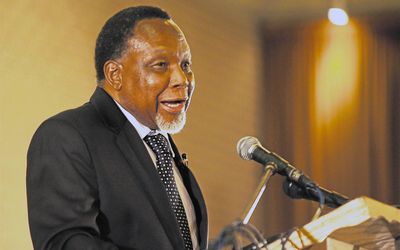AMID the dearth of dignity as President Jacob Zuma stubbornly insists he has done no wrong in the Nkandla saga, it comes as something of a relief to hear a statesman-like speech from the Presidency.
Deputy President Kgalema Motlanthe’s comments on western hegemony and the role of the International Criminal Court (ICC), prepared for delivery at the University of Pretoria earlier in the week, provided much food for thought.
He proposes that the African Union’s (AU’s) African Court on Human Rights — whose jurisdiction is limited to interpreting the African Charter on Human and Peoples’ Rights, among other treaties ratified by the AU — be broadened to cover the three core international crimes: genocide, crimes against humanity and war crimes.
The context, of course, is the prosecution of Kenya’s president and deputy president on charges of orchestrating the wave of ethnic violence that swept the country after the 2007 election. It has prompted heavy criticism from African countries. Backed by the AU, they allege that the ICC turns a blind eye to similar crimes elsewhere and has an unhealthy obsession with Africa.
Mr Motlanthe clearly sympathises with this view, but takes a characteristically philosophical approach, pointing out that understanding international institutions demands that "geopolitical power relations" be taken into account, especially the reality that at this point in history the western world-view is dominant. He does not suggest that western hegemony should not be questioned, just that railing against it is not in Africa’s best interests. And the continent needs to get its own house in order before it can expect its complaints about the modus operandi of bodies such as the ICC to be taken seriously.
It would not be necessary for the ICC to charge so many African leaders with genocide, crimes against humanity and war crimes if such crimes were not taking place on the continent, or if a continental body such as the AU was in a position to deal with them. Hence Mr Motlanthe’s proposal that the African Court be empowered to take on such international crimes, not as a substitute for the ICC but as a means of nipping situations in the bud and avoiding the need for the Statue of Rome, which gave rise to the ICC, to be brought into play.
The slogan "African solutions to African problems" will remain meaningless until African institutions take up the responsibility to hold African leaders to account.

Deputy President Kgalema Motlanthe. Picture: SOWETAN
AMID the dearth of dignity as President Jacob Zuma stubbornly insists he has done no wrong in the Nkandla saga, it comes as something of a relief to hear a statesman-like speech from the Presidency.
Deputy President Kgalema Motlanthe’s comments on western hegemony and the role of the International Criminal Court (ICC), prepared for delivery at the University of Pretoria earlier in the week, provided much food for thought.
He proposes that the African Union’s (AU’s) African Court on Human Rights — whose jurisdiction is limited to interpreting the African Charter on Human and Peoples’ Rights, among other treaties ratified by the AU — be broadened to cover the three core international crimes: genocide, crimes against humanity and war crimes.
The context, of course, is the prosecution of Kenya’s president and deputy president on charges of orchestrating the wave of ethnic violence that swept the country after the 2007 election. It has prompted heavy criticism from African countries. Backed by the AU, they allege that the ICC turns a blind eye to similar crimes elsewhere and has an unhealthy obsession with Africa.
Mr Motlanthe clearly sympathises with this view, but takes a characteristically philosophical approach, pointing out that understanding international institutions demands that "geopolitical power relations" be taken into account, especially the reality that at this point in history the western world-view is dominant. He does not suggest that western hegemony should not be questioned, just that railing against it is not in Africa’s best interests. And the continent needs to get its own house in order before it can expect its complaints about the modus operandi of bodies such as the ICC to be taken seriously.
It would not be necessary for the ICC to charge so many African leaders with genocide, crimes against humanity and war crimes if such crimes were not taking place on the continent, or if a continental body such as the AU was in a position to deal with them. Hence Mr Motlanthe’s proposal that the African Court be empowered to take on such international crimes, not as a substitute for the ICC but as a means of nipping situations in the bud and avoiding the need for the Statue of Rome, which gave rise to the ICC, to be brought into play.
The slogan "African solutions to African problems" will remain meaningless until African institutions take up the responsibility to hold African leaders to account.





















Change: -0.47%
Change: -0.57%
Change: -1.76%
Change: -0.34%
Change: 0.02%
Data supplied by Profile Data
Change: -1.26%
Change: -0.29%
Change: -0.47%
Change: 0.00%
Change: -0.42%
Data supplied by Profile Data
Change: 1.32%
Change: 1.30%
Change: 0.97%
Change: 0.96%
Change: 1.05%
Data supplied by Profile Data
Change: 0.16%
Change: -0.31%
Change: 0.33%
Change: -1.38%
Change: -2.39%
Data supplied by Profile Data